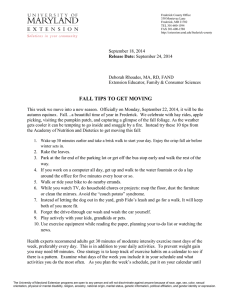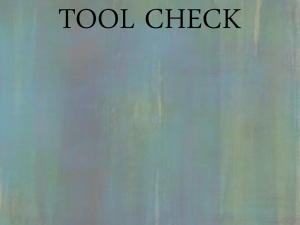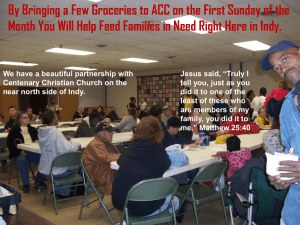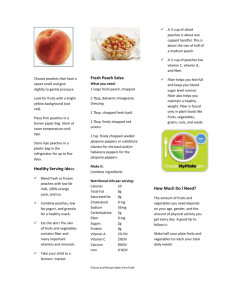Document 14893774
advertisement
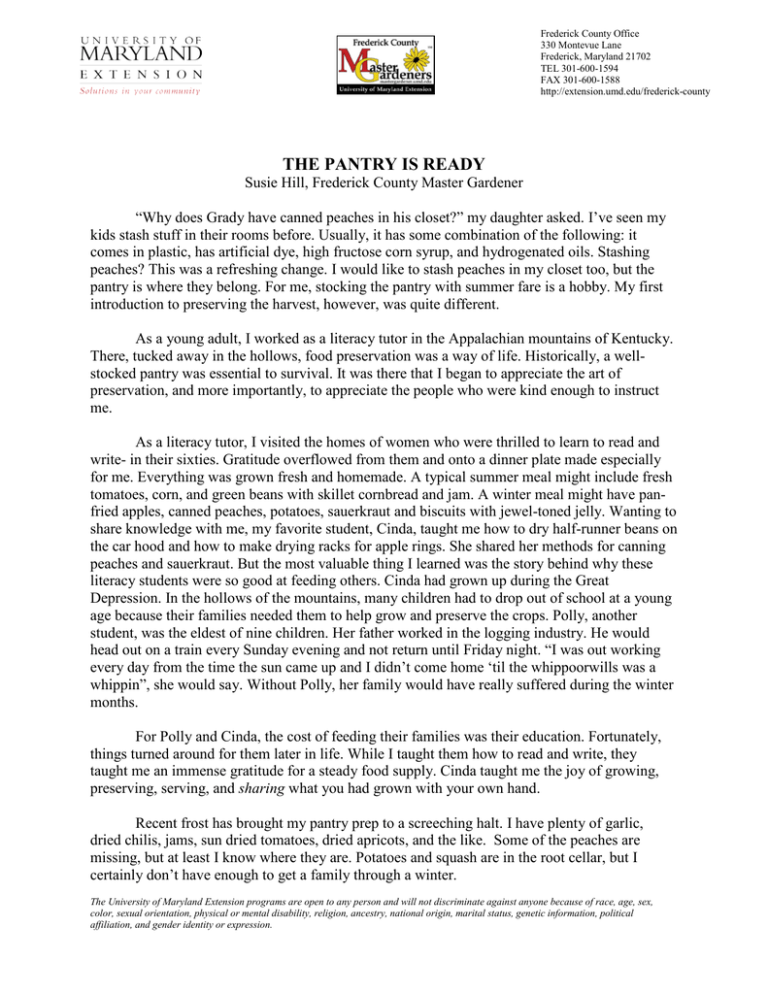
Frederick County Office 330 Montevue Lane Frederick, Maryland 21702 TEL 301-600-1594 FAX 301-600-1588 http://extension.umd.edu/frederick-county THE PANTRY IS READY Susie Hill, Frederick County Master Gardener “Why does Grady have canned peaches in his closet?” my daughter asked. I’ve seen my kids stash stuff in their rooms before. Usually, it has some combination of the following: it comes in plastic, has artificial dye, high fructose corn syrup, and hydrogenated oils. Stashing peaches? This was a refreshing change. I would like to stash peaches in my closet too, but the pantry is where they belong. For me, stocking the pantry with summer fare is a hobby. My first introduction to preserving the harvest, however, was quite different. As a young adult, I worked as a literacy tutor in the Appalachian mountains of Kentucky. There, tucked away in the hollows, food preservation was a way of life. Historically, a wellstocked pantry was essential to survival. It was there that I began to appreciate the art of preservation, and more importantly, to appreciate the people who were kind enough to instruct me. As a literacy tutor, I visited the homes of women who were thrilled to learn to read and write- in their sixties. Gratitude overflowed from them and onto a dinner plate made especially for me. Everything was grown fresh and homemade. A typical summer meal might include fresh tomatoes, corn, and green beans with skillet cornbread and jam. A winter meal might have panfried apples, canned peaches, potatoes, sauerkraut and biscuits with jewel-toned jelly. Wanting to share knowledge with me, my favorite student, Cinda, taught me how to dry half-runner beans on the car hood and how to make drying racks for apple rings. She shared her methods for canning peaches and sauerkraut. But the most valuable thing I learned was the story behind why these literacy students were so good at feeding others. Cinda had grown up during the Great Depression. In the hollows of the mountains, many children had to drop out of school at a young age because their families needed them to help grow and preserve the crops. Polly, another student, was the eldest of nine children. Her father worked in the logging industry. He would head out on a train every Sunday evening and not return until Friday night. “I was out working every day from the time the sun came up and I didn’t come home ‘til the whippoorwills was a whippin”, she would say. Without Polly, her family would have really suffered during the winter months. For Polly and Cinda, the cost of feeding their families was their education. Fortunately, things turned around for them later in life. While I taught them how to read and write, they taught me an immense gratitude for a steady food supply. Cinda taught me the joy of growing, preserving, serving, and sharing what you had grown with your own hand. Recent frost has brought my pantry prep to a screeching halt. I have plenty of garlic, dried chilis, jams, sun dried tomatoes, dried apricots, and the like. Some of the peaches are missing, but at least I know where they are. Potatoes and squash are in the root cellar, but I certainly don’t have enough to get a family through a winter. The University of Maryland Extension programs are open to any person and will not discriminate against anyone because of race, age, sex, color, sexual orientation, physical or mental disability, religion, ancestry, national origin, marital status, genetic information, political affiliation, and gender identity or expression. Fortunately, my family is not reliant upon my ability to preserve the harvest so we can survive a winter. I do these things in memory of my friends in Kentucky, because it is a great way to avoid doing boring chores, and because it brings me great joy. I think part of the reason Grady made off with the peaches is because we made them together. Another reason is that they are just SO delicious that he was afraid that he wouldn’t get enough of them. Perhaps I will make sun dried tomatoes with him next year. I’d be thrilled to find that under his bed rather than another candy wrapper. For more information about the Frederick County Master Gardener/Horticulture Program, visit : http://extension.umd.edu/frederick-county/home-gardening or call Susan Trice at the University of Maryland Extension Frederick County office, 301-600-1596. Find us on Facebook at http://www.facebook.com/mastergardenersfrederickcountymaryland The University of Maryland Extension programs are open to any person and will not discriminate against anyone because of race, age, sex, color, sexual orientation, physical or mental disability, religion, ancestry, national origin, marital status, genetic information, political affiliation, and gender identity or expression.

